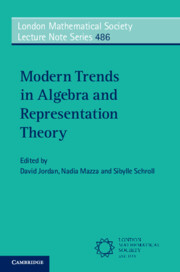Book contents
- Frontmatter
- Contents
- Contributors
- Preface
- Introduction
- 1 Auslander–Reiten Theory of Finite-Dimensional Algebras
- 2 τ-tilting Theory – an Introduction
- 3 From Frieze Patterns to Cluster Categories
- 4 Infinite-dimensional Representations of Algebras
- 5 The Springer Correspondence
- 6 An Introduction to Diagrammatic Soergel Bimodules
- 7 A Companion to Quantum Groups
- 8 Infinite-dimensional Lie Algebras and Their Multivariable Generalizations
- 9 An Introduction to Crowns in Finite Groups
- 10 An Introduction to Totally Disconnected Locally Compact Groups and Their Finiteness Conditions
- 11 Locally Analytic Representations of p-adic Groups
- References
10 - An Introduction to Totally Disconnected Locally Compact Groups and Their Finiteness Conditions
Published online by Cambridge University Press: 25 November 2023
- Frontmatter
- Contents
- Contributors
- Preface
- Introduction
- 1 Auslander–Reiten Theory of Finite-Dimensional Algebras
- 2 τ-tilting Theory – an Introduction
- 3 From Frieze Patterns to Cluster Categories
- 4 Infinite-dimensional Representations of Algebras
- 5 The Springer Correspondence
- 6 An Introduction to Diagrammatic Soergel Bimodules
- 7 A Companion to Quantum Groups
- 8 Infinite-dimensional Lie Algebras and Their Multivariable Generalizations
- 9 An Introduction to Crowns in Finite Groups
- 10 An Introduction to Totally Disconnected Locally Compact Groups and Their Finiteness Conditions
- 11 Locally Analytic Representations of p-adic Groups
- References
Summary
We introduce the theory of totally disconnected locally compact (TDLC) groups, including basic properties of topological groups, a proof of van Dantzig’s theorem and some of the most popular (and trouble-free) examples of TDLC groups. The focus is onTDLC groups that satisfy (homological) finiteness conditions with more emphasis on compact generation: for compactly generated TDLC groups, the notion of the Cayley–Abels graph permits us to deal with the topological group as a geometric object.
Information
- Type
- Chapter
- Information
- Modern Trends in Algebra and Representation Theory , pp. 335 - 369Publisher: Cambridge University PressPrint publication year: 2023
